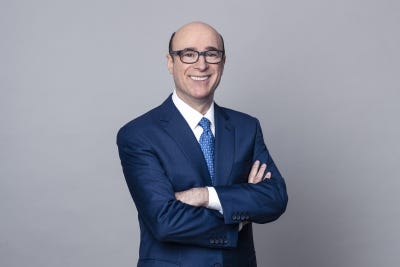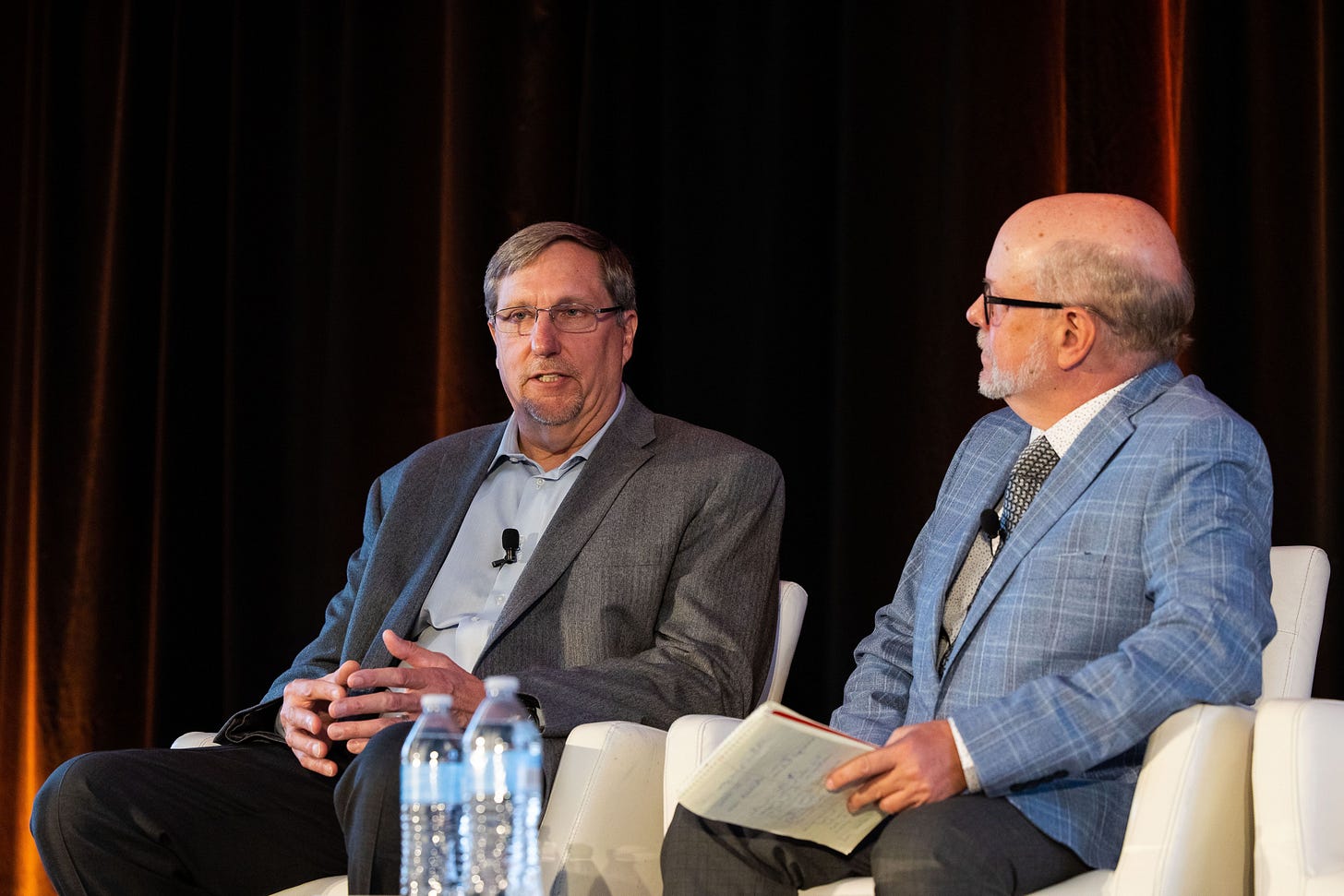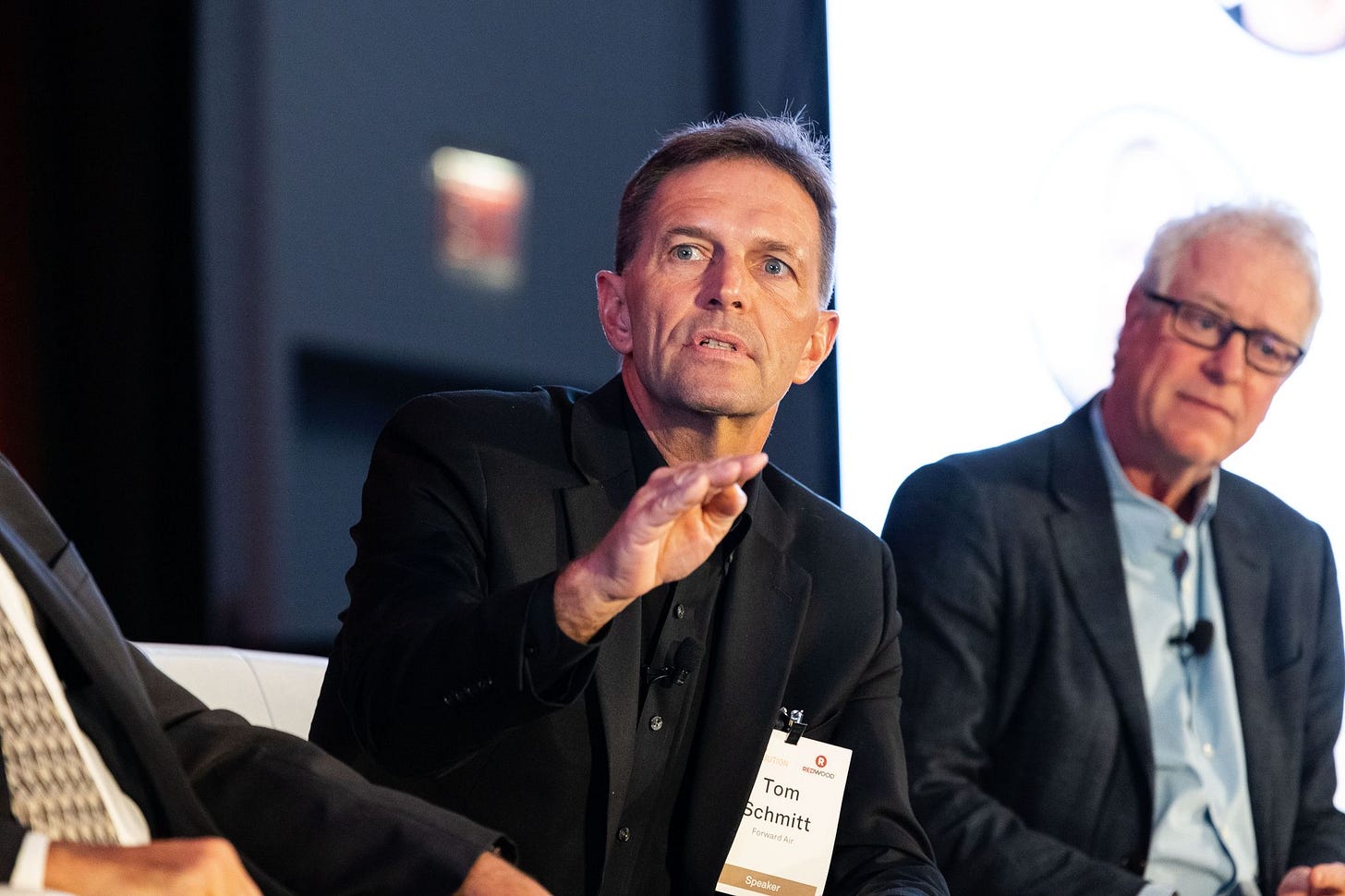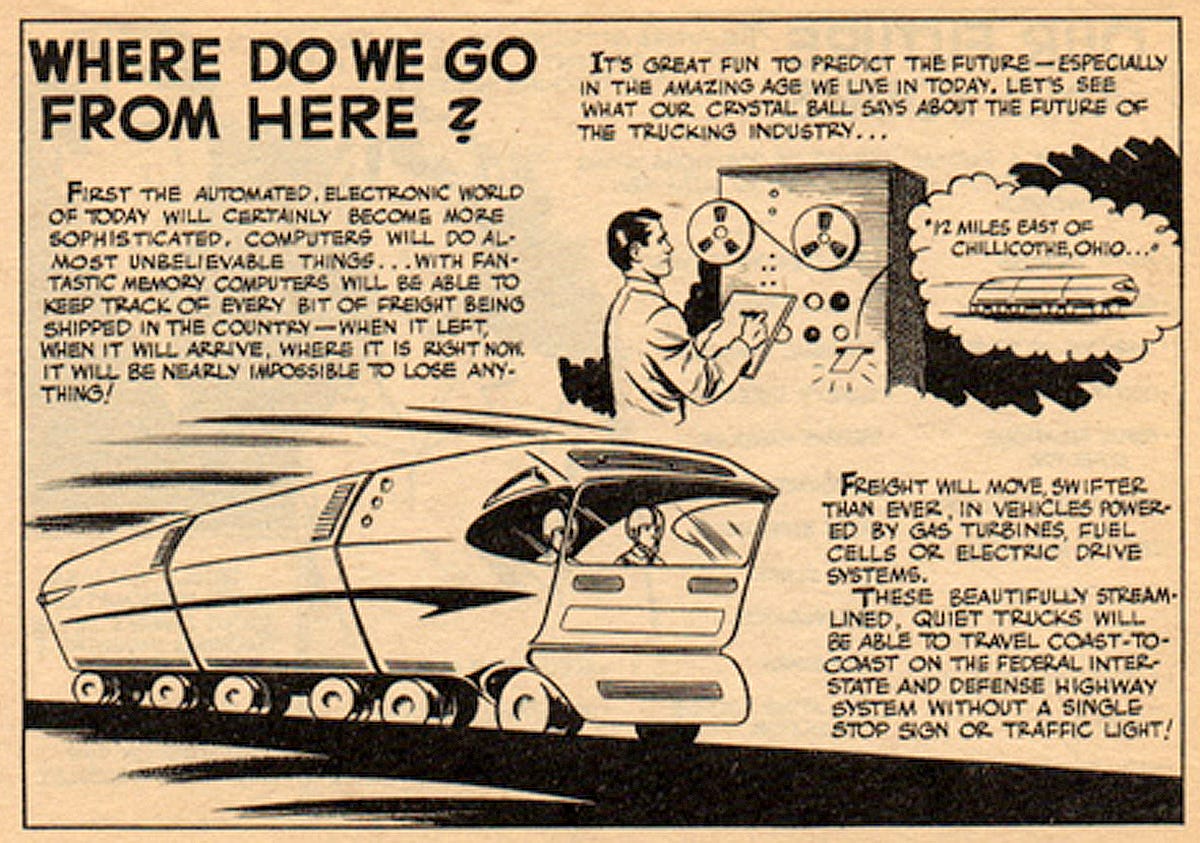Next Big Thing
XPO Logistics' Brad Jacobs is looking for a new industrial "sweet spot" for investment and growth as he prepares to hand the CEO role at XPO to Mario Harik.
Welcome to the 16th edition of The Fifth Wheel with Bill Cassidy, an occasional look at a particular aspect of trucking or transportation that’s on my mind or in the news or just caught my eye. Something of a reporter’s notebook, something of a column. I’ll also post occasional insights and reflections on one of my favorite topics, transportation history.
Brad Jacobs’ Next Big Thing. XPO Logistics is preparing for a big transition Nov. 1, with founder Bradley S. Jacobs getting ready to cede his CEO’s seat to Mario Harik, the long-term CIO who is now president of LTL (less-than-truckload) at XPO. The spin-off of freight brokerage RXO will set the transition in motion.
Jacobs, 66, will remain at XPO as executive chairman, but his eyes are already scanning the horizon for the next multi-billion-dollar opportunity.
“I’ve just started the hunt for my next big thing,” Jacobs said in a recent interview. “I’m doing the same thing I’ve done in the past, looking at large industries where my skill set in creating shareholder value would be a big fit. I’ll look at technology, financial services, energy, biotech, other forms of life sciences, and industrial services, which is my sweet spot,” he said.
Jacobs has been called a “career CEO.” LTL and parcel guru Satish Jindel, president of SJ Consulting Group, calls him “a seasoned roll-up executive.” By roll-up he means consolidation of a sector by acquisition. RXO will be the sum of years of roll-up acquisitions in the freight brokerage market, starting with the purchase of Express-1 Expedited Solutions in 2011, the deal that launched XPO Logistics.
Jacobs started his first company, Amerex Oil Associates, in 1979 and has founded six enterprises, including GXO. Publicly owned companies founded by Jacobs include United Waste System (1989), United Rentals (1997), and XPO (2011) and GXO (2021). Jacobs seeks out fragmented industries where he can build businesses through acquisition, creating shareholder value as his enterprises and profits grow.
He said he won’t compete with XPO Logistics or spin-offs GXO and RXO, “but there are non-transportation-related parts of industrial services I can take a look at. I’ll find something that can create immense amounts of shareholder value. I’ve always taken my role as a steward for the equity shareholders have given us very seriously.”
Exceeding expectations. Shareholder value is what the rapid expansion of XPO and its even more rapid split up via spin-offs has been all about.
The way Jacobs assembled and built out the company over the last decade often confounded the expectations of logistics experts, who questioned how such a logistics conglomerate would work. But Jacobs didn’t create XPO to become a logistics magnate. The goal was always creating that “immense value” for shareholders. In that, “we exceeded our expectations,” he said.
“There’s always going to be skepticism when you go counter to the conventional wisdom,” Jacobs said. “The key is to feel comfortable with that. If you only do what the consensus deems in vogue, you’ll end up flying high and failing low. You won’t find places that other people overlook and have value creation opportunities.”
XPO “accomplished things that people doubted in earlier days,” he said. “Having doubters is a motivation to succeed. You’re motivated to prove them wrong.”
Turning point. The acquisition of LTL and logistics provider Con-way in 2015 was a watershed moment for XPO. “When we announced we were buying Con-way we had a very negative reaction,” Jacobs said. “I said, ‘Be patient, this may be the most value-creating transaction I’ve done.’ … It’s up there in the top five.”
Con-way drove XPO into asset-based trucking, complementing its non-asset brokerage operation, XPO’s original roll-up target. The company went from being primarily non-asset to asset-light or “asset-right.” But XPO’s LTL operation became more than Con-way with another name. Investment and technology transformed the LTL business, now the fourth-largest LTL provider by revenue in the US.
The LTL operation became increasingly profitable, almost immediately, and even after a rough patch in terms of profitability in 2021 the LTL business was able to adjust and now had an adjusted operating ratio (OR) of 80.4 percent and a 15.5 percent increase in operating profit in the second quarter. Jacobs sees opportunity for greater improvement as XPO becomes a “pure-play” LTL operator under Harik.
“We still have ways to improve the company, and Mario will lead that charge,” Jacobs said. “He’s got a huge amount of respect from the workforce. They feel very comfortable with him and admire him. He’s much smarter than I am and at the same time he’s humble. He’s compassionate and a good-natured person. But he never swears, so I don’t know if he’ll fit in with the trucking industry.”
CIO to CEO. Harik was the third employee Jacobs hired at XPO. As CIO, he’s been behind much of the technological development at XPO since 2011, both in LTL and in brokerage, including products such as XPO Direct and XPO Connect. In years to come, XPO will become an ever more technology-driven LTL trucking company.
“I see technology being the prime mover of the business going forward,” Jacobs said. “We’ll see more and more machine-to-machine communication via API, EDI, and the Internet, and less business being done by phone calls, text messages, and e-mails.”
The era of artificial intelligence and autonomous vehicles isn’t as far off as some in logistics believe, in Jacobs’ opinion. He’s always been willing to make a call others might think too far-out-there or futuristic. XPO began deploying autonomous warehouse robots years ago, for example.
“When you look at the P&L sheet of the universe, you constantly see things that looked ridiculous at first eventually becoming the norm,” he told me in a 2014 interview. The key, he said, is learning to look at those “ridiculous” things, including, perhaps, driverless trucks and 3D printing networks, in a new way.
And that’s an approach that will help him find that “next big thing.”
JOC INLAND. I spent three days in Chicago last month that seemed more like three weeks — in a good way — at the 2022 JOC Inland Distribution Conference. The reason it seemed so long was we packed a lot into those three days: A shipper roundtable, more than 20 panels and keynote interviews, four think tanks, and several networking events. That’s me above interviewing Joe Jaska, D.B. Schenker’s vice president of land transport for the Americas. Jaska is now in charge of USA Truck, a $770 million truckload carrier and broker that Schenker acquired in September.
Jaska spoke on the interest international logistics and transportation companies have in the US domestic market, an interest piqued by shipper demand for end-to-end services. “We want to be a capacity solution, right? We want to be able to have some flexibility in what we're able to offer customers,” rather than being “just” a forwarder or a truckload carrier or a broker, Jaska said. “We've got a lot of options, and our customers will have a lot of options.” Read more about our on-stage interview.
The Journal of Commerce covered the conference extensively during and after the event. Thanks to everyone who participated — we had more than 80 speakers and 600 attendees, and we’ll be back in Chicago next Sept. 25-27 for Inland 2023. Here’s some of the coverage from this year:
US truck shippers rethinking spot strategy: analysts (Oct. 5)
No recession for US warehouse demand: JOC Inland speakers (Sept. 30)
LTL industry wrestles with next stage of technology development (Oct. 5)
Domestic chassis balance likely to come in 2023: equipment providers (Sept. 29)
Procurement adaptability trumps truckload pricing predictions: software providers (Oct. 10)
Also review Cathy Morrow Roberson’s daily report on the conference in her Freight Forward LinkedIn newsletter. Here are links to Day 1 and Day 2.
RECESSION CALLS. S&P Global Market Intelligence, the parent of the Journal of Commerce, now forecasts a mild US recession starting in the fourth quarter and lasting until the second or third quarter of next year. How mild? Paul Bingham, director of transportation consulting for the S&P group, told JOC Inland attendees he expects economic contraction of “less than 1 percent.”
“We will see higher unemployment, lower wage inflation and lower price inflation over the next two years,” said Bingham. “We’ll see a downturn in imports and exports. Fundamentally, we foresee weak demand for the portions of the economy that need freight transport.”
None of those things have happened yet, but give it time. At the moment, trucking demand remains higher than a year ago, according to Jason Miller, associate professor of logistics at Michigan State University and, full disclosure, a JOC analyst.
The for-hire trucking ton-mile index (TTMI) published by Miller and Yemisi Bolumole, PhD rebounded in August on both a non-seasonally adjusted and seasonally adjusted basis, Miller said in a LinkedIn post Oct. 13. Their TTMI is calculated as a weighted geometric mean of physical output from 41 freight generating industries across mining, manufacturing, wholesale trade, retail trade, and warehousing, where weights come from the Commodity Flow Survey.
The seasonally adjusted TTMI indicates ton-miles are flattening at about 3 percent above year ago levels. “August 2022’s reading is the highest ton-mile reading in the history of US trucking,” Miller said. “You don’t have year-over-year ton-mile increases of 3 percent during a recession.” Click here for Miller’s post and charts.
The next recession has been foreshadowed for months as the US Federal Reserve raised interest rates to fight inflation. There have been claims we’re already in a recession, after two consecutive quarters of shrinking gross domestic product, but it’s not a recession until the National Bureau of Economic Research makes the call.
If a recession does hit, with unemployment extremely low and demand still above pre-pandemic trend lines, “it will be the oddest recession we've ever had," said Crystal Anderson, director of North American logistics for food manufacturer Ingredion.
Tom Schmitt had a bold request: “If there's a recession, please bring it on,” the chairman, president, and CEO of Forward Air said. “We've been paralyzed for the last six months talking about the scary things that might happen.”
Well-run companies will come out of the downturn stronger, he said. “Will we fall through the bottom? No, we will not. Bring it on and we'll deal with it and get through it faster."
Tom Schmitt of Forward Air at JOC Inland 2022. “Recession? Please bring it on." Photos courtesy JOC.
FLASHBACK … OR FORWARD? I’m not sure whether this advertisement was published in the 1950s or 1960s (the latter seems more likely). “Freight will move swifter than ever, in vehicles powered by gas turbines, fuel cells, or electric drive systems …” Well, we’re getting there. I’ve been invited to moderate a Council of Supply Chain Management Professionals (CSCMP) webinar on truck electrification — more news on that to come soon. What’s really exciting in this ad? This:
“With fantastic memory computers will be able to keep track of every bit of freight being shipped in the country — when it left, when it will arrive, where it is right now. It will be nearly impossible to lose anything!”
We’re not quite there yet either — but someday …
KILTING IT. I promised our JOC Inland event staff that if we reached 600 registered attendees, I would wear my kilt the last night of the event. We got there, so I did.
That’s Peter Tirschwell, long-time JOC colleague and vice president of maritime, trade & supply chain at S&P Global Market Intelligence, celebrating with me.
Thanks for subscribing to this newsletter. For those that don’t know me, I’ve been the senior editor for trucking and domestic transportation at The Journal of Commerce and JOC.com since 2009. Before that, I spent 13 years as managing and executive editor at Traffic World, a weekly magazine once owned by the JOC. I got my start in this business with Fleet Owner, a monthly magazine then owned by McGraw-Hill.
I can be reached at bill.cassidy@ihsmarkit.com, on Twitter at @willbcassidy, and on LinkedIn. Any opinions in this blog represent the author’s views, not the Journal of Commerce, IHS Markit, or S&P Global.






